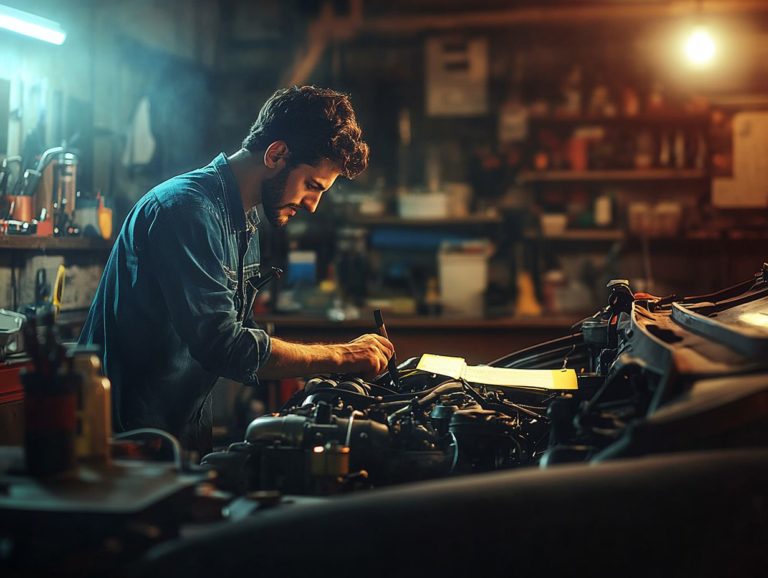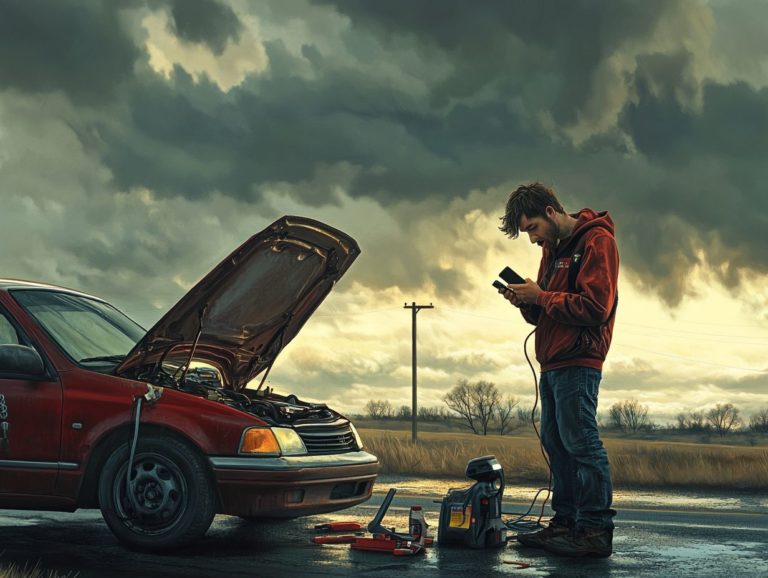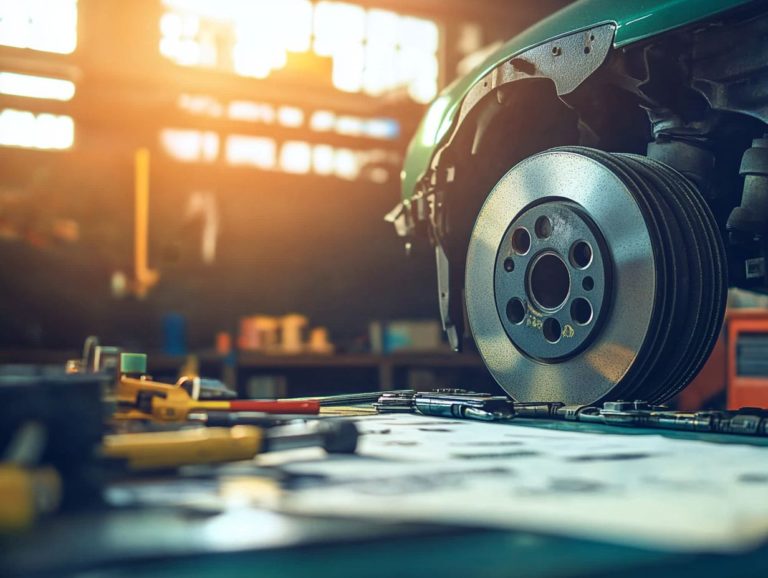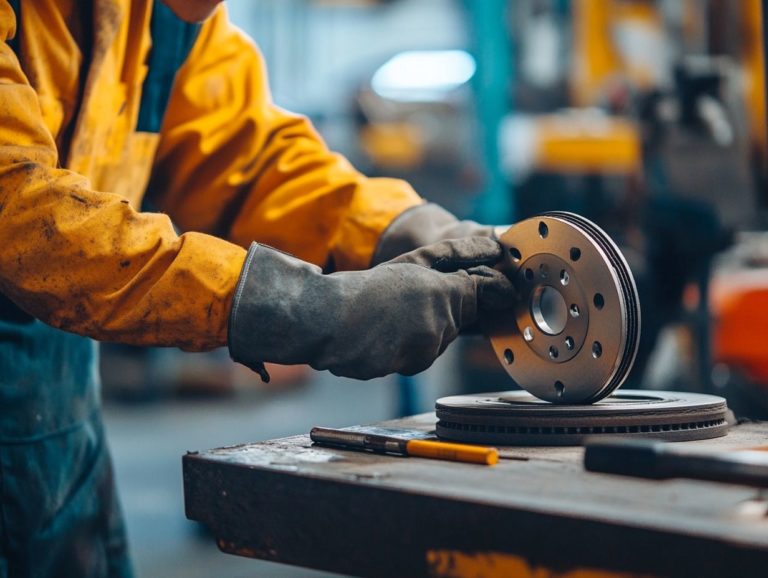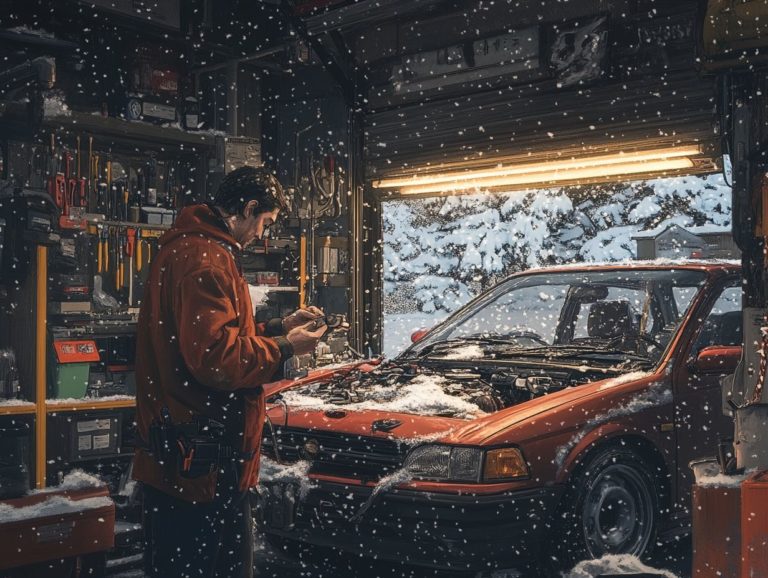DIY Car Repairs: What You Can Fix Yourself
Fixing your own car can be an incredibly rewarding experience. Not only does it save you money, but it also enhances your confidence and skill set.
Whether you re mastering basic tasks like oil changes or tackling more complex repairs, there s a wide range of jobs that are well within your reach as a DIY enthusiast.
This guide will walk you through simple maintenance tasks, essential tools you’ll need, and critical safety measures to ensure that your repairs go off without a hitch. It will also help you discern when it s best to enlist the help of professionals.
Get ready to revolutionize your connection with your vehicle!
Contents
- Key Takeaways:
- Basic Car Maintenance and Repairs
- Intermediate Car Repairs
- Tools and Equipment Needed for DIY Car Repairs
- Safety Measures for DIY Car Repairs
- When to Seek Professional Help
- Frequently Asked Questions
- What are some common car repairs that can be done by yourself?
- Do I need any special tools or knowledge to perform DIY car repairs?
- What are the benefits of performing DIY car repairs?
- Are there any risks involved with attempting DIY car repairs?
- Are there any repairs that should always be left to a professional?
- Where can I find reliable information and tutorials for DIY car repairs?
Key Takeaways:
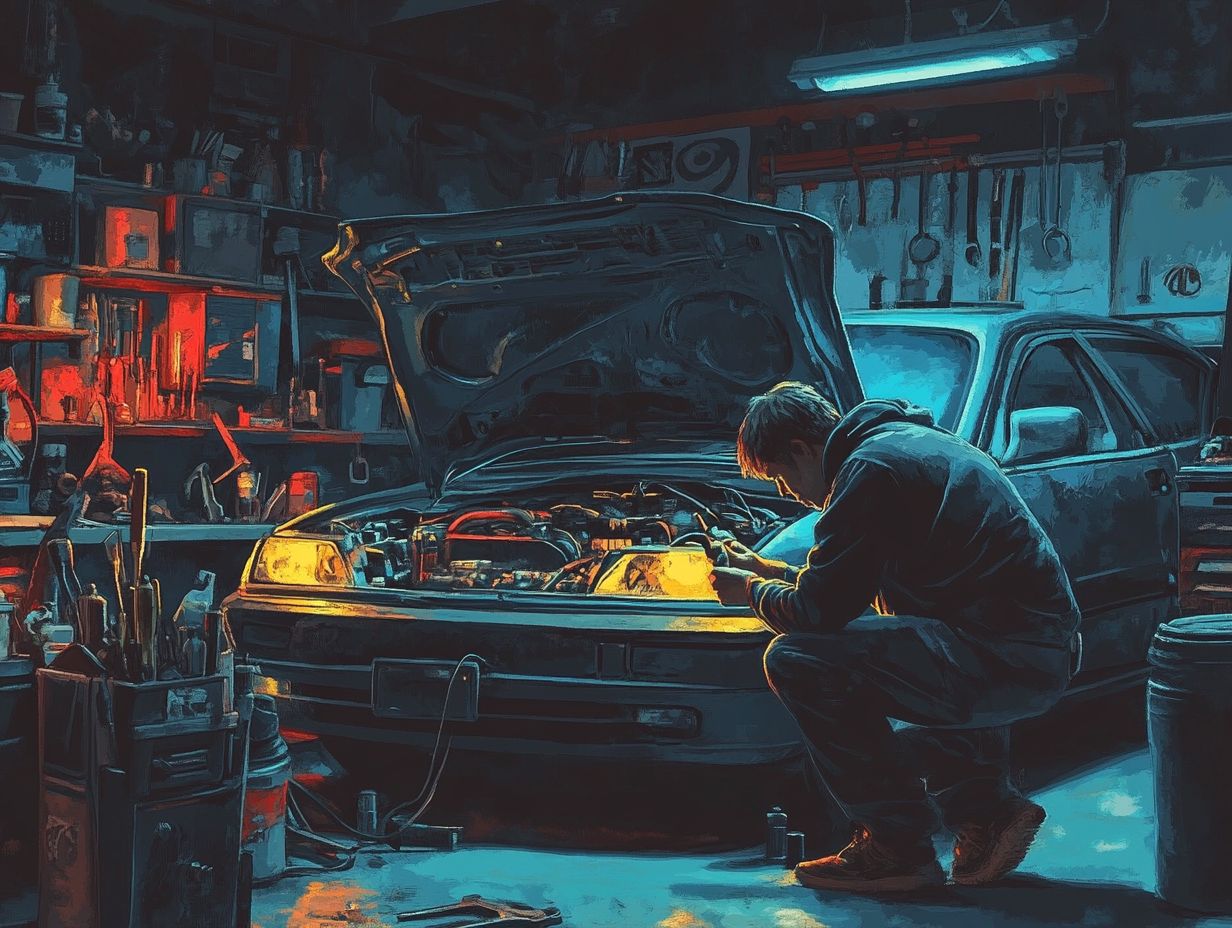
- Save money and gain a sense of accomplishment by fixing your own car.
- Learn and perform simple tasks like changing oil and replacing air filters.
- With some practice and the right tools, you can tackle intermediate repairs like brake replacements and spark plug changes.
Benefits of Fixing Your Own Car
Engaging in DIY car repairs saves you money. It also empowers you with invaluable skills that enhance your understanding of vehicle maintenance.
By taking the initiative to change tires, replace air filters, and diagnose car problems, you forge a deeper connection with your vehicle. This process simultaneously boosts your confidence in your mechanical abilities.
Knowing how to maintain coolant levels and inspect brake pads ensures your car remains in optimal condition. This leads to safer driving experiences and fewer trips to the mechanic.
When you tackle routine tasks like checking oil levels or replacing spark plugs, you cultivate self-sufficiency. This proves particularly beneficial during emergencies.
The financial advantages are undeniable. Not only do you save on labor costs, but you also gain the ability to select affordable parts, circumventing potential markups from service centers.
As you hone your skills through practice, you may find yourself ready to tackle more complex repairs in the future, fostering a continuous learning journey.
In essence, these DIY experiences transform vehicle upkeep into an engaging and rewarding endeavor.
Basic Car Maintenance and Repairs
Basic car maintenance and repairs are crucial for extending the lifespan of your vehicle and ensuring it performs at its best. Engaging in simple tasks like maintaining tire pressure, topping off fluid levels, and cleaning headlights can prevent larger issues from arising. This keeps your car running smoothly.
Regular inspections like checking oil levels and changing air filters are vital for spotting potential problems before they escalate. This proactive approach empowers you to take charge of your vehicle’s health, ultimately saving you significant money on repairs.
Simple Tasks You Can Do Yourself
You have a wealth of simple tasks at your fingertips for DIY car repairs. This makes vehicle care accessible to everyone, no matter their level of mechanical expertise.
Activities like changing a tire, cleaning headlights, and refilling fluid levels are not just straightforward; they allow you to maintain both the functionality and appearance of your vehicle.
By taking on these tasks, you ll save money on professional services while gaining invaluable hands-on experience in car maintenance.
You can also replace the battery a task that s relatively uncomplicated with just a few tools and some careful attention. This ensures reliable starts and helps you avoid unexpected breakdowns due to battery failure.
Another essential DIY job is cleaning the air intake, which plays a critical role in engine efficiency and performance. Removing dirt and debris allows your engine to breathe better, ultimately enhancing fuel economy.
You can even learn to diagnose car problems using tools that help you check your car’s health. This allows you to pinpoint issues before they escalate into costly repairs. This knowledge not only saves you time and money but also makes DIY car maintenance an enlightening and economical endeavor.
Intermediate Car Repairs
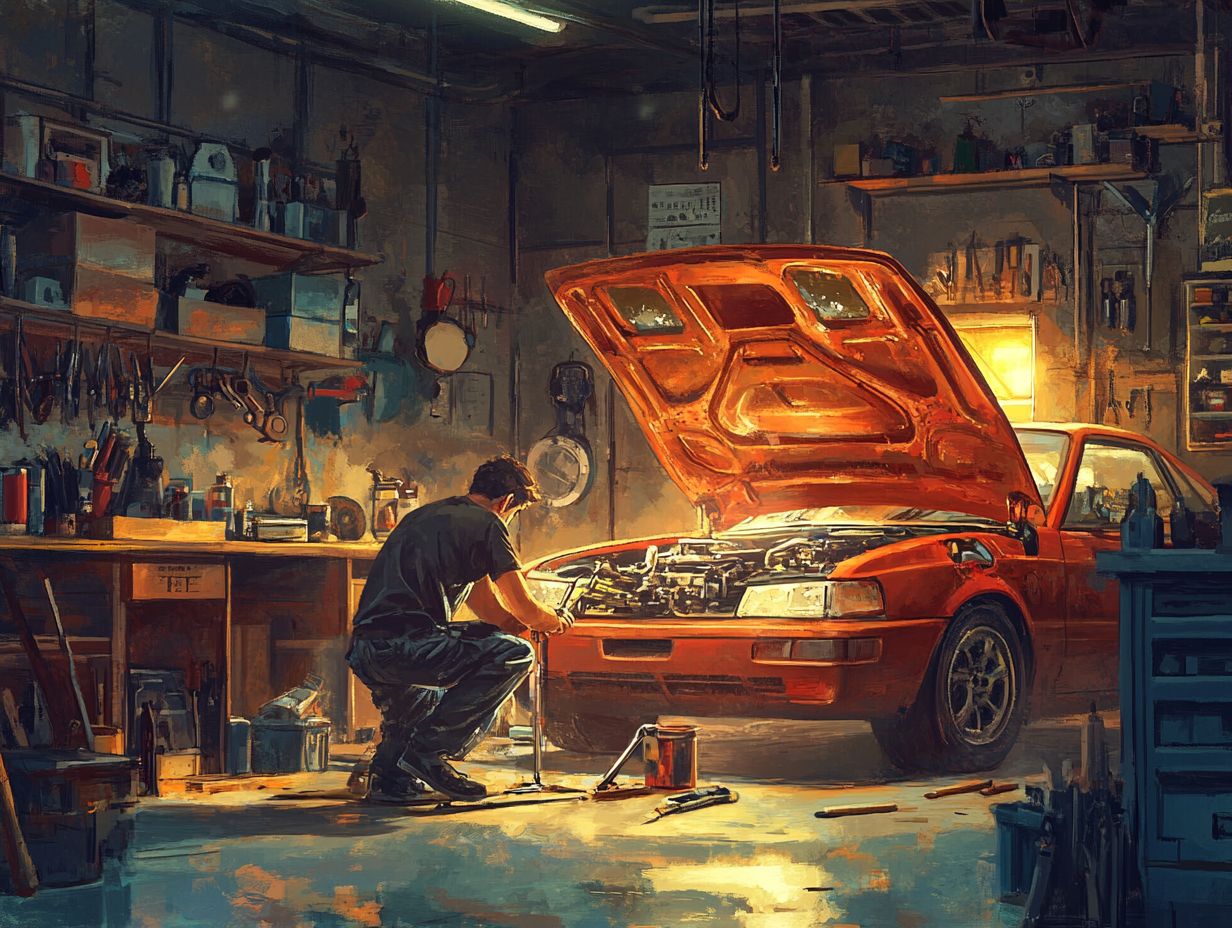
Intermediate car repairs empower you to expand your mechanical skill set and address more complex issues that may arise with your vehicle. Tasks such as fixing flat tires, changing spark plugs, and repairing power locks demand a deeper understanding and specialized tools, offering a rewarding experience for those eager to elevate their car maintenance abilities.
Mastering these skills enhances your expertise and reduces your reliance on professional mechanics for routine repairs.
More Complex Repairs You Can Learn to Do
As you gain confidence in your DIY car repairs, consider diving into more complex tasks that can truly elevate your vehicle’s performance and longevity. Tasks like changing engine coolant, repairing rust, or troubleshooting electrical issues may seem daunting, but they re incredibly rewarding, allowing you to explore the fascinating world of automotive mechanics.
For example, replacing the alternator and changing differential oil require specialized tools and a solid grasp of your vehicle’s mechanics. Likewise, repairing the Exhaust Gas Recirculation (EGR) valve is essential for maintaining optimal engine efficiency and emissions control, making it a worthwhile endeavor to master.
Tackling these intricate repairs ensures you keep your car running like new! You ll save money on professional services while enjoying the satisfaction of your accomplishments. This journey into advanced repair tasks will deepen your automotive knowledge and highlight the crucial role of regular maintenance.
Tools and Equipment Needed for DIY Car Repairs
Ready to tackle car repairs? First, you need the right tools and equipment. Equipping yourself with the right tools is essential for mastering DIY car repairs, allowing you to tackle a range of automotive tasks effortlessly and efficiently.
Whether you re just starting out or have a wealth of experience, having key tools such as wrenches, screwdrivers, and diagnostic equipment can significantly elevate your repair and maintenance capabilities.
By investing in high-quality tools, you streamline your workflow and empower yourself to handle everything from straightforward tasks like replacing air filters to more intricate repairs like changing power steering fluid.
Essential Tools for Every DIY Mechanic
Every DIY mechanic should have a well-stocked toolbox brimming with essential tools for performing car repairs efficiently and safely. Consider including:
- A jack for changing tires
- A socket set for various repairs
- Pliers for gripping and twisting wires
Investing in a reliable multimeter for troubleshooting electrical issues and a torque wrench for precision can significantly elevate your repair capabilities.
A scrub brush is critical for cleaning the throttle body, ensuring your engine performs at its best. For tasks like replacing struts, having a spring compressor on hand simplifies the job and prevents accidents. A wire brush makes it easy to clean corrosion off battery terminals, prolonging the life of your vehicle s electrical components.
Each of these tools boosts the effectiveness of your repairs and enables you to tackle projects with confidence and precision, ultimately saving you both time and money.
Safety Measures for DIY Car Repairs
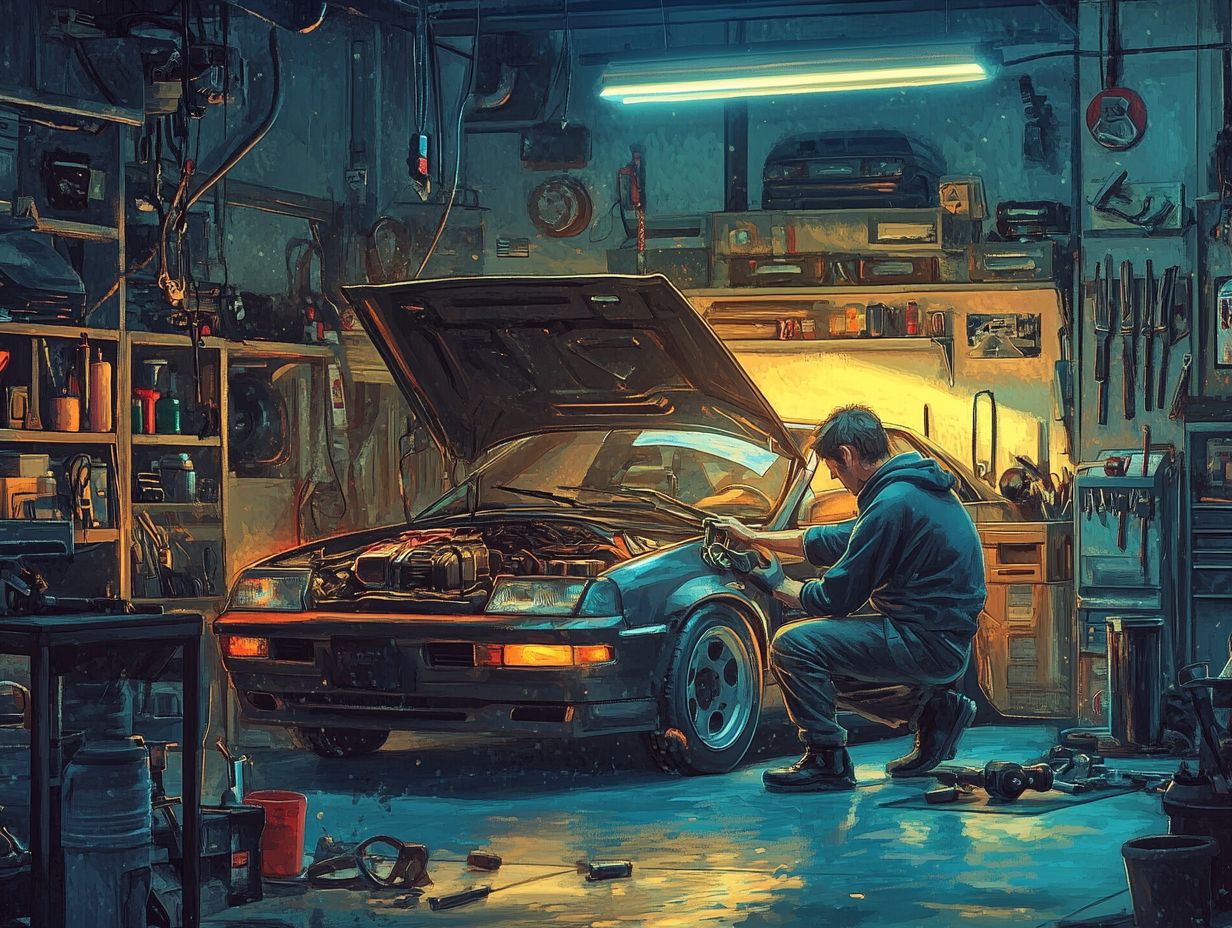
Prioritizing safety measures during your DIY car repairs is crucial for preventing injuries and ensuring a successful experience with your vehicle. Wearing protective gear like gloves and goggles can effectively shield you from dirt, debris, and hazardous materials you might encounter while changing oil or repairing rust.
Familiarizing yourself with the correct techniques for lifting your car safely and using tools properly can greatly minimize the risk of accidents.
Precautions to Take Before Starting a Repair
Before diving into any DIY car repairs, taking the right precautions can elevate both your safety and the success of your task. Always ensure you’re working in a well-ventilated area and follow the proper procedures for securing your vehicle.
Check that you have the appropriate tools and replacement parts, such as filters or batteries. This can significantly streamline the repair process and help you dodge unnecessary complications.
It’s crucial to wear suitable safety gear, including gloves and goggles, to shield yourself from potential hazards. If your project involves more intricate tasks like fixing trailer light wiring or tackling stains in upholstery a thorough review of the manual can provide valuable insights into specific techniques you might need.
Before you start repairing damaged nuts or bolts, make sure you fully understand each step involved. If possible, consult tutorials or seek advice from experienced individuals. Preparing properly promotes safety. It also boosts your chances of completing repairs successfully.
When to Seek Professional Help
Knowing when to call in a pro for car repairs can save you time and money. Pay attention to persistent warning lights on the dashboard, unusual noises while driving, or any car issues that leave you scratching your head.
Recognizing these signals early on can help you avert more significant damage and ultimately save you money in the long run.
Signs Your Car Needs Professional Attention
Recognizing the signs that your car needs professional attention is crucial in preventing minor issues from snowballing into major problems. If you notice symptoms like frequent overheating, difficulties starting, or sudden drops in fuel efficiency, don’t wait seek help right away!
Encountering issues such as a malfunctioning exhaust gas recirculation valve (EGR) or persistent brake problems? Consulting a professional is vital to keeping your vehicle safe and reliable.
Unusual noises like grinding or squealing when braking or knocking sounds from the engine should never be brushed aside. These can indicate underlying damage that may escalate if left unaddressed.
Stay attentive to warning lights on your dashboard; for example, the check engine light often suggests that routine maintenance is due or that specific components are on the fritz. If you feel vibrations or notice your car pulling to one side while driving, it s a clear signal that alignment or suspension work may be in order.
By remaining vigilant and proactive about these symptoms, you can maintain optimal performance and ensure your car operates smoothly for the long haul.
Frequently Asked Questions
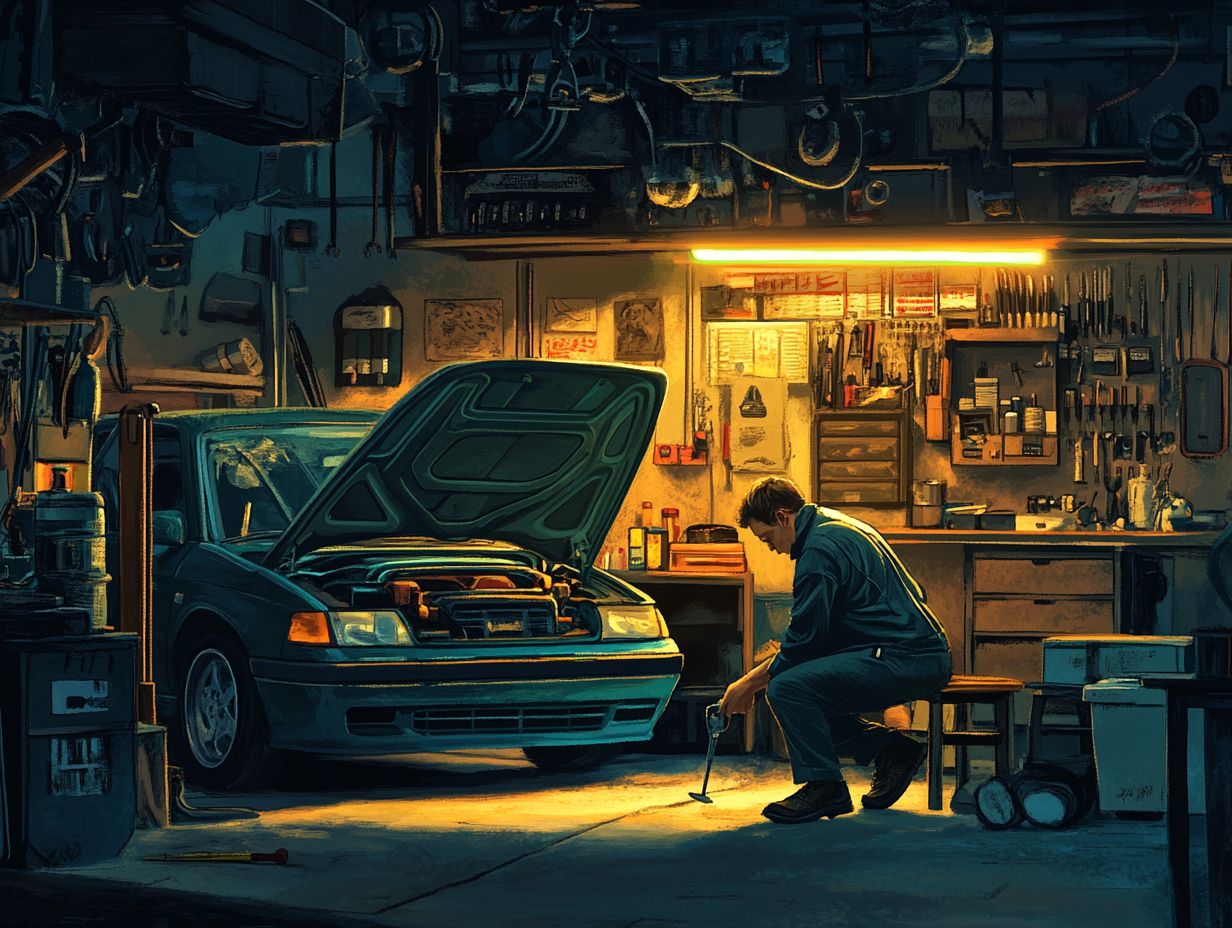
What are some common car repairs that can be done by yourself?
Some common car repairs that can be done by yourself include changing the oil, replacing the air filter, changing spark plugs, replacing brake pads, changing a flat tire, and replacing windshield wipers.
Do I need any special tools or knowledge to perform DIY car repairs?
While some repairs may require specific tools or knowledge, many common car repairs can be done with basic tools and some online research. It’s important to educate yourself and have the right tools before attempting any repairs.
What are the benefits of performing DIY car repairs?
Performing DIY car repairs can save you money on labor costs and also give you a better understanding of your vehicle. It can be a rewarding and satisfying experience to fix something on your own.
Are there any risks involved with attempting DIY car repairs?
Yes, there are risks involved with attempting DIY car repairs. Not having the proper knowledge or tools can lead to further damage to your vehicle or even injury. It’s important to assess your abilities and research properly before attempting any repairs.
Are there any repairs that should always be left to a professional?
Yes, certain repairs should always be handled by a professional. This includes work on the engine parts and electrical systems.
If you’re unsure about a repair, take your car to a trusted mechanic.
Where can I find reliable information and tutorials for DIY car repairs?
Excited to fix your car? You can find tons of online resources! Check out YouTube channels, forums, and reputable websites for step-by-step tutorials.
Always ensure the information comes from a trusted source before following any instructions.

